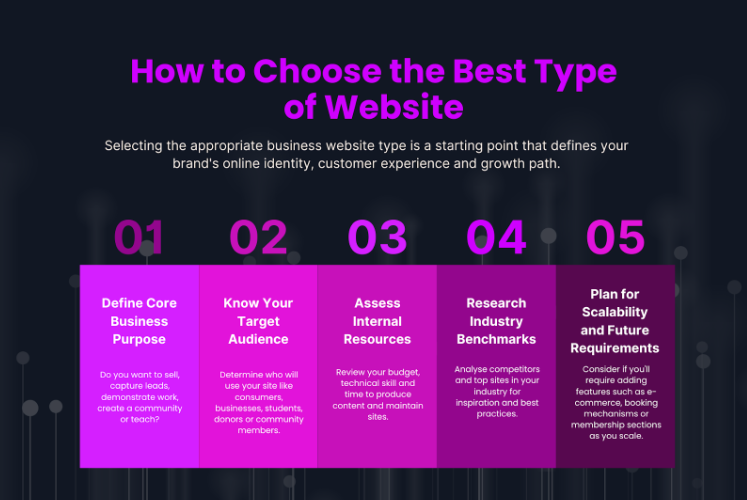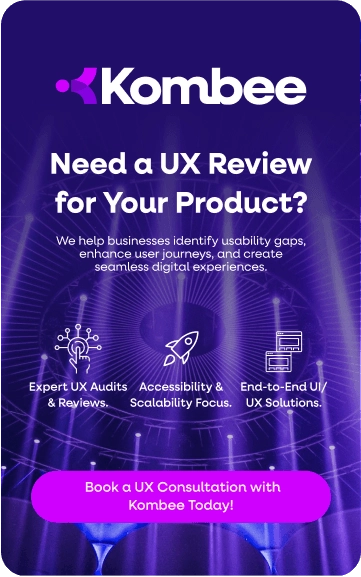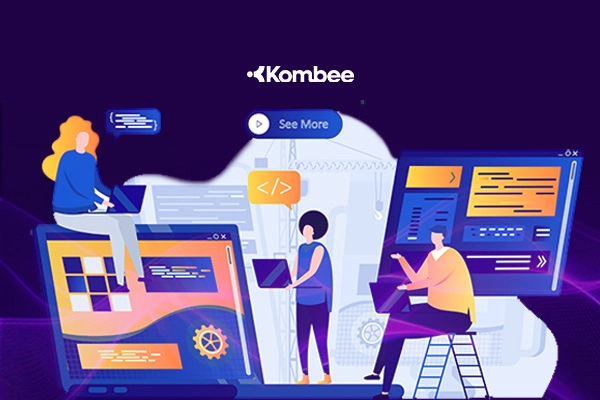Introduction
What if the reason your website isn’t performing isn’t the design or content but because it’s the wrong type altogether? More than 71% of small companies now have a website. Yet, not all websites are created equal.
Therefore, diving straight into creating a website without actually knowing the type of it may end up wasting time, money and opportunity.
Hence, choosing the right one can lead to more rapid growth, improved connections and increased sales.In this blog, let’s make sure you are aware so you can make an informed choice and get the results you want.
How to Choose the Best Type of Website

Selecting the appropriate business website type is a starting point defining your brand's online identity, customer experience and growth path.
- Define Core Business Purpose: Do you want to sell, capture leads, demonstrate work or maybe create a community and teach?
- Know Your Target Audience: Determine who will use your site like consumers, businesses, students, donors or community members. Understand expectations, browsing patterns and preferred devices.
- Assess Internal Resources: Review your budget, technical skill and time to produce content and maintain sites. Small teams will find website builders suitable while larger organizations will opt for custom development.
- Research Industry Benchmarks: Analyse competitors and top sites in your industry for inspiration and best practices. Find gaps and areas for differentiation.
- Plan for Scalability and Future Requirements: Consider if you'll require adding features like e-commerce, booking mechanisms or membership sections as you scale. Opt for a platform that is aligned with your vision for the future.
If you need expert help bringing this to life, Kombee offers website development services tailored for interactive, scalable business sites designed for future growth.
10 Different Types of Business Websites
Below are 10 types of websites that business owners need to be familiar with and assist in determining which one is best suited according to their intentions.
1. E-commerce Business Websites
If you're primarily looking to sell goods online, this is where you begin.
E-commerce business websites are virtual storefronts. Shoppers can browse, purchase and pay all from their computers or mobile devices.
These websites feature:
- Product pages
- Carts and checkouts
- Payment methods
- Inventory management
Platforms like Shopify make launching a simple process. Just take a look at some Shopify website samples and you'll notice the way brands utilize this kind of website to grow quickly.
A great storefront website is clean, simple and easy to navigate. It invites customers in and makes buying a breeze.
Case Study: Kombee developed an e-commerce site for Leonard’s Superior Smallgoods using WooCommerce. The result was a secure, easy-to-use online store with payment options, order tracking and a seamless customer experience, proving how the right website type can directly boost business.
2. Business Portfolio Website
If you’re in a creative or service-based industry, a business portfolio website is essential. A business portfolio website type of site is built to showcase your products, services and case studies, not just talk about it. It’s main goal is to build credibility and attract new clients or partners.
It usually includes:
- A gallery or project showcase
- Testimonials
- Case studies or examples
- Easy contact options
Whether you're an agency, photographer or designer, your website is your online resume. And when it's good, it sells for you.
Among all the different types of sites, this one is particularly well-suited for establishing trust and credibility with prospects.
3. Corporate Business Websites
These are the virtual HQs of a brand.
Corporate business websites are designed to present a professional image. It typically includes information about services, contact details, testimonials and calls to action. Here. also large businesses, service companies or B2B organizations come to mind.
You'll generally see:
- Company overview and mission
- Team bios
- Service descriptions
- Investor and press pages
This type of site establishes authority and enables partners, clients and investors to quickly understand what your business is about. Any successful growing business will eventually require a corporate business website.
4. Storefront Website
A storefront website is a product-oriented, focused site. It's a streamlined e-commerce site, ideal for companies looking to sell a few products or promote a local store.
If you aren't prepared for a comprehensive product catalogue but need a classy online presence, this is a smart choice.
Storefront sites are particularly valuable for single-product brands, restaurants and local boutiques. Check out Shopify website examples to notice how clean and conversion-ready these sites can be.
5. Blog or Content Website
Blogs aren't reserved for authors anymore. Nowadays, any brand can gain from content marketing. A blog website is a content-focused website where articles, news or stories are posted in a chronological order.
Such a website will be ideal if your plan involves:
- Sharing tutorials or tips
- Building SEO
- Driving traffic from Google
Your blog may also be part of your e-commerce business website or corporate website, helping you educate customers and establish trust over time.
Need more insight? Read our blog on “Why Your Business Needs a Professional Website in 2025” for a deeper look into today’s digital expectations.
6. Directory or Listing Website
Ever used Yelp or a job board? That's this category. A directory or listing website categorises and displays entities like properties in a searchable or browsable format. The main goal here is to help people find specific listings based on filters like location, category or keywords.
These can also be:
- Local businesses
- Freelancers
- Job openings
- Service providers
If your company brings people together with other companies or professionals, this is one of the most practical sites to create. It can also be monetized with the sale of featured listings or advertising.
7. Course or Educational Website
Want to educate something? This is your site. A course or educational website is built to provide instructional content, courses or resources.
This site works great for:
- Coaches and consultants
- Online schools
- Industry experts
You can include:
- Courses
- Memberships
- Certifications
- Downloadable resources
Add this to e-commerce platforms and you have a site that sells information and generates revenue.
8. Forum or Community Website
This is for companies looking to create an online community. A forum or community website is created to foster discussion, interaction and knowledge-sharing among users who share common topics and goals.
It's centred on user-generated content, discussion and interest.
Features:
- User profiles
- Discussion threads
- Private groups or chats
Whether you have a niche company, service product users or manage a fanbase, this kind of website keeps you in touch and expands your tribe.
9. Nonprofit or Cause-Based Website
Nonprofit or cause-based websites are designed to promote a mission or cause. These websites focus on storytelling, trust and support. They aim to inspire trust and mobilize support and not sell products or services. If your organization needs donations, volunteers or awareness, this site is ideal.
Key features:
- Donation systems
- Volunteer sign-ups
- Impact stories
The goal is to inspire action. Among all the types of websites, this one is about people and purpose.
10. Hybrid or Multi-Purpose Website
Not every business fits into a single category and that’s okay.
You may require several sites, including a business website portfolio site, a storefront site and a corporate business site with built-in features like a blog and shop.
Options like the above are among the top Shopify site examples, which are hybrids that combine e-commerce with strong branding and content.
When done well, hybrid sites offer several benefits, including the freedom to grow and evolve without being limited.
So… What's Best for You?
Options like the above are a brief guide:
- Want to sell products? Go with e-commerce business websites or a storefront website.
- Want to show off your work? Build a strong business portfolio website.
- Running a large company? You’ll need a full corporate business website.
- Just starting? Browse Shopify website examples for inspiration and direction.
Each of these 10 types of website has a specific purpose. The key is to choose the one that best aligns with your goals, your team and your budget.
Conclusion
Selecting the correct type of website is more than a matter of design, it's a strategic decision. Whether it's a storefront website to generate sales, a business portfolio website to showcase your work or a corporate business website to establish credibility, your choice matters. Of the 10 website types, the optimal choice depends on your intentions and demographics.
Still lost? Do you have questions on how to create a site that will serve your purpose? Reach out to Kombee, we can help you make it a reality.
Frequently Asked Questions
1. Can my business website include more than one type?
Yes, many modern websites are hybrids. You can combine features from multiple types like adding a blog to a storefront website or e-commerce to a corporate site to meet different goals and scale flexibly.
2. What is the most cost-effective type of website for a new business?
A simple storefront website or business portfolio website is often the most budget-friendly. These provide essential functionality and professional presence without the complexity or cost of full-scale custom development.
3. How do I know if an e-commerce website is right for my business?
If your business sells physical or digital products and you want to accept payments online, an e-commerce website is ideal. It’s right for you if your goal includes generating direct online revenue.
4. What should every business website include, no matter the type?
At a minimum, every website should have a homepage, about section, contact info, and privacy policy. Clear navigation, mobile responsiveness, and fast loading times are also essential for all types of website.







